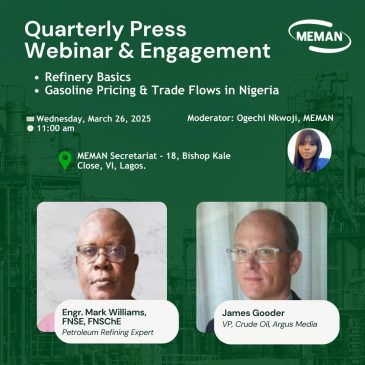PIA implementation is on track – MEMAN
By Yunus Yusuf
The Major Energies Marketers Association of Nigeria (MEMAN) says the implementation of the Petroleum Industry Act (PIA) remains firmly on track, in spite of the ongoing discussions about its impact on the industry.
Mr Clement Isong, the Executive Secretary of MEMAN, confirmed this during the 2025 first quater media training and engagement by the association on Wednesday in Lagos.
The Business intelligence(TBI AFRICA) reports that the event with the theme, “Refinery Basics, Gasoline Pricing, and Trade Flows in Nigeria”, brought together energy correspondents to discuss the evolution of nation’s energy sector.
Isong highlighted that while debates surrounding the PIA were natural in any significant industry transformation, they should be encouraged as part of the natural evolution toward a market-driven energy sector.
He stressed that transitioning from a state-controlled system to a competitive, deregulated market was crucial for driving efficiency, transparency and long-term economic growth.
“Such a transition requires patience, adaptation and trust.
“As the market stabilises, challenges will inevitably arise, and resistance from those accustomed to price controls is to be expected.
“However, with strong regulation, industry collaboration, and public transparency, Nigeria can fully realise the benefits of this transformation,” Isong said.
He further explained that a well-functioning, deregulated market would attract more investment, enhance efficiency and create a more competitive landscape that benefits both businesses and consumers.
Isong also emphasised the essential role of regulatory bodies like the Nigerian Midstream and Downstream Petroleum Regulatory Authority (NMDPRA) and the Federal Competition and Consumer Protection Commission (FCCPC) in ensuring a fair and transparent marketplace.
He urged these agencies to focus on market stability, consumer protection and building public confidence in the reform process.
“Engagements like this, which foster industry dialogue and thought leadership are critical for market growth and development.
“MEMAN strongly believes that these discussions are essential for the continued progress of the energy sector,” he added.
During the event, Mr James Gooder, Vice President of Crude Oil at Argus Media, discussed the impact of local refining on Nigeria’s fuel market.
He noted that while Dangote’s refinery is a significant game-changer, it does not dominate the West African market, as other import options remain competitive.
“It would not be beneficial for Nigeria to shift from an NNPC monopoly to a Dangote monopoly under a fully deregulated market framework,” Gooder said.
He added that spite of the local refining volumes, the importation of petroleum products into Nigeria continued.
He acknowledged the impact of Dangote Refinery in the market but pointed out that its production was not yet at full capacity.
As a result, he said that imported fuel would continue to play a vital role in meeting Nigeria’s demand.
He also highlighted that the commencement of Dangote Refinery’s crude oil refining in November 2023 (or 2024 if that is in fact accurate), has reshaped market dynamics and reduced fuel smuggling to neighboring countries.
“By combining deregulation with local refining, Nigeria’s fuel market has become more transparent, cutting down illegal petrol exports to Cameroon and Niger.
“The competition between Dangote and fuel importers has led to a gradual drop in petrol prices, with rates in Lagos now hovering around N868 to N870 per litre,” Gooder explained.
Gooder also noted a decline in Nigeria’s petrol demand, which has led to more efficient consumption and reduced reliance on imports.
“Notably, Nigeria has begun exporting significant volumes of Premium Motor Spirit (PMS) to the global market, a development that would have been unimaginable just a few years ago,” he added.
Mr Mark Williams, a petroleum refining expert, also delivered a presentation on refining fundamentals.
He called on the NMDPRA to restrict the circulation of petroleum products from “topping refineries,” which are typically unsophisticated facilities that cannot meet modern specifications for lead and sulfur content in fuels.
“Topping refineries produce products that are no longer viable for the market.
“These refineries lack basic support operations and cannot meet the required specifications needed by both regulatory authorities in Nigeria and globally,” Williams explained.
Williams emphasised the health risks associated with sulfur in fuel, which could lead to the emission of harmful sulfur oxides.
He noted the significant improvements made in reducing sulfur content in diesel over the years, from as high as 5000 parts per million (ppm) in the 1970s and 1980s to just 10 ppm today.
He said that by commending NNPC for upgrading its plants to meet the AFRI-5 standard, which limits sulfur content to a maximum of 50 ppm.
He said that as the PIA continues to take shape, MEMAN remains confident that the reforms would ultimately lead to a more efficient, transparent and competitive energy sector, benefiting both businesses and consumers across Nigeria.





